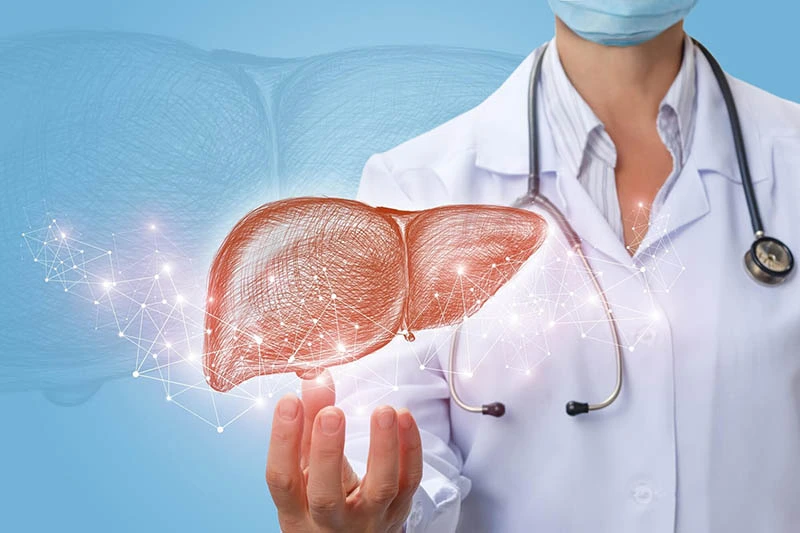The Importance of Maintaining a Healthy Liver
The liver is the largest internal organ in the body, weighing about 1.4-1.6 kg in adults, and located on the right side of the abdomen, just below the diaphragm.
The liver plays many essential roles in maintaining the body’s functions. The liver’s main functions include:
- Nutrient metabolism: The liver is crucial in metabolizing nutrients from food, including carbohydrates, fats, and proteins.
- Carbohydrate metabolism: After eating, the liver converts excess glucose in the blood into glycogen for storage. When the body needs energy, the liver breaks down glycogen into glucose to supply energy. The liver also participates in gluconeogenesis, creating glucose when dietary intake is insufficient.
- Lipid (fat) metabolism: The liver breaks down fats to produce energy and synthesizes lipids necessary for cells. The liver also produces cholesterol, which is vital for cell membrane structure and hormone production. Additionally, the liver regulates lipid levels in the blood, helping to prevent cardiovascular diseases.
- Protein metabolism: The liver is important in synthesizing proteins, especially plasma proteins like albumin and clotting factors. The liver also metabolizes amino acids from proteins and removes ammonia, a toxic byproduct of protein breakdown, by converting it to urea for excretion through the kidneys.
- Filtering and detoxifying:
- Blood filtration: The liver receives blood from the digestive system through the portal vein, which contains toxins from food, medications, and digestive byproducts. The liver processes and removes these toxins before the blood returns to circulation.
- Detoxification: The liver processes harmful substances like alcohol, drugs, and chemicals by converting them into less harmful substances or substances that can be easily excreted via urine or feces. This process involves liver enzymes, such as cytochrome P450.
- Additionally, the liver is involved in:
- Bile production,
- Storing vitamins and minerals (A, D, E, K) and releasing them when needed,
- Synthesizing proteins related to blood, such as albumin and clotting factors like fibrinogen and prothrombin,
- Regulating blood sugar,
- Managing and metabolizing hormones to maintain endocrine balance in the body.
If the liver becomes damaged or its functions are impaired, the body may exhibit warning signs:
- Jaundice (yellowing of the skin and eyes): When the liver cannot process bilirubin (a waste product from red blood cells), it causes yellowing of the skin and the whites of the eyes.
- Itchy skin: Toxin buildup in the body due to liver dysfunction can cause uncomfortable itching.
- Fatigue: The liver’s inability to metabolize energy efficiently leads to prolonged fatigue.
- Abdominal swelling: When the liver fails to process fluids, the abdomen may swell due to fluid retention.
- Dark urine: Bilirubin accumulation in the blood can cause dark-colored urine.
- Easy bruising: Impaired liver function reduces the production of clotting factors, leading to easy bruising or bleeding.
To protect and enhance liver function, it’s important to adopt a healthy lifestyle and follow a diet that supports liver health:
- Limit alcohol consumption: Drinking alcohol is one of the leading causes of liver damage. Up to 70% of people with alcohol-related liver disease suffer from this condition. If patients with cirrhosis or alcoholic hepatitis continue drinking, no surgical or medical treatment can prevent liver failure. Limiting or avoiding alcohol entirely helps reduce the liver’s burden.
- Eat plenty of vegetables and fruits: Leafy greens like spinach, kale, and antioxidant-rich fruits help protect the liver from free radicals and enhance its detoxifying functions.
- Increase fiber intake: Consuming more fiber from whole grains, fruits, and vegetables aids digestion and reduces the liver’s workload.
- Avoid foods high in sugar and fats: Foods rich in sugar and saturated fats increase the risk of fatty liver and other liver problems.
- Stay hydrated: Drinking enough water helps the liver efficiently eliminate toxins and maintain metabolic processes.
- Include liver-friendly foods: Foods like garlic, turmeric, grapefruit, and coffee (in moderation) can help improve liver function.
Maintaining a healthy, balanced diet, managing stress, and exercising regularly will help keep your liver healthy and prevent liver diseases. You can also consider taking liver-supporting supplements with safe, natural ingredients such as Green Detox.



Good